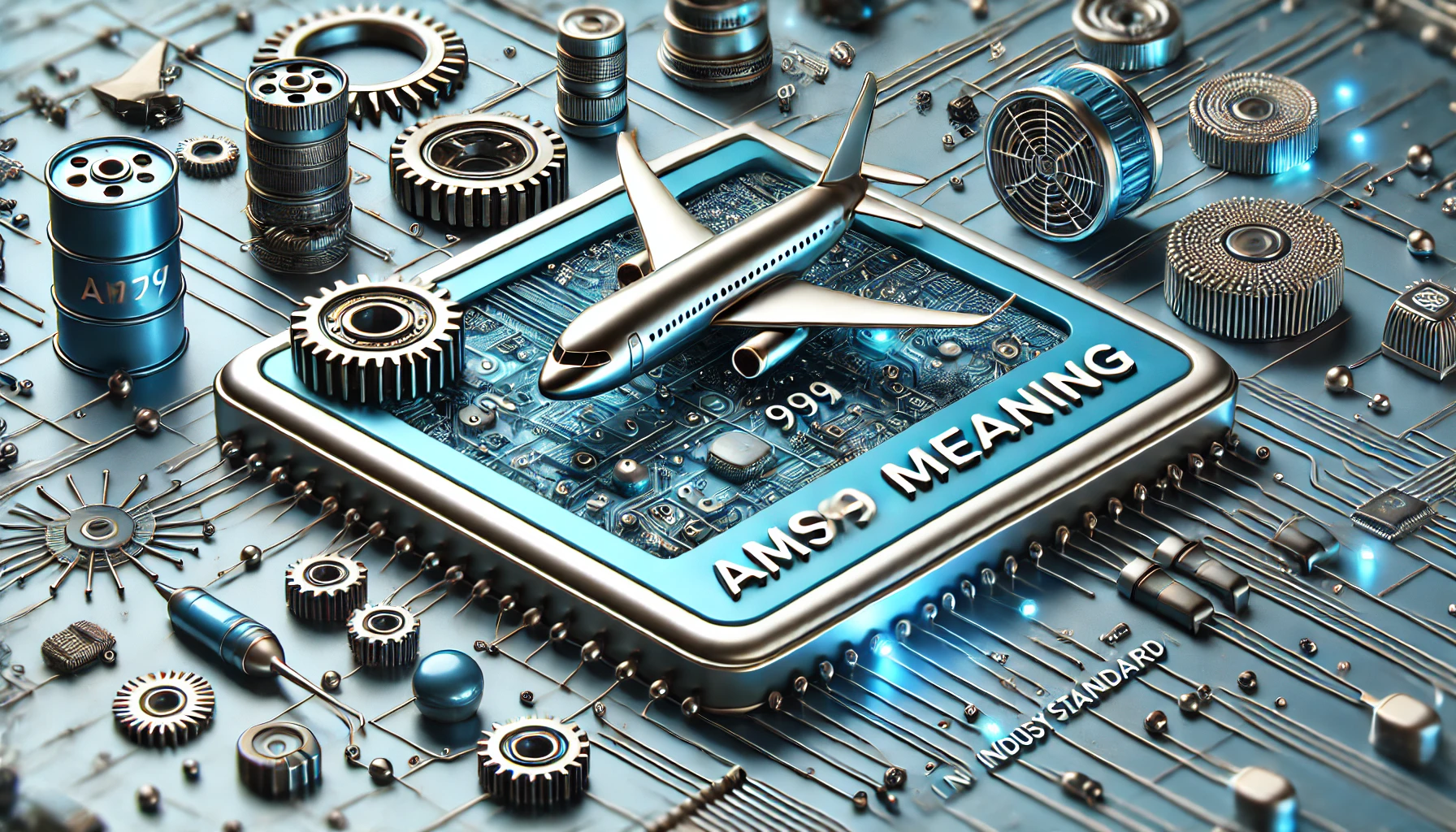
Introduction
In fields like aviation, automotive, and even technology, maintaining material standards is essential for safety, reliability, and performance. One such standard that plays a crucial role across these industries is AMS99W. While it may not be widely recognized outside technical circles, the AMS99W meaning extends far, impacting material choices and ensuring components are built to last. This article explores AMS99W in detail, its historical evolution, key features, applications, and its potential future directions, making it clear why AMS99W is vital for high-stakes industries.
What is AMS99W?
AMS99W is a material specification standard that ensures the materials used in aviation, automotive, and other high-performance industries meet strict quality and performance standards. Initially developed for aerospace, AMS99W covers a wide range of material requirements, including strength, corrosion resistance, thermal stability, and fatigue resistance. Each of these characteristics is essential for parts that must withstand high-stress environments without compromising safety or durability.
The Evolution of AMS99W: From Inception to Industry Standard
Understanding the AMS99W meaning requires a look at its evolution. Initially introduced to meet the demanding needs of aerospace engineering, AMS99W began as a set of guidelines for materials that could endure extreme conditions. Over time, as both aviation and automotive industries advanced, the standard adapted to meet new challenges, incorporating materials suited for newer technologies like high-performance vehicles and modern aircraft.
Today, AMS99W stands as a recognized standard for durable, high-quality materials across industries, evolving in response to technological advancements and rising safety requirements. Its flexibility and rigorous quality specifications make it a trusted choice for manufacturers who prioritize reliability.
Key Features and Benefits of AMS99W
AMS99W includes several key features that make it indispensable for manufacturers and suppliers in high-stakes industries. Here’s a breakdown of the most important aspects:
High Strength-to-Weight Ratio
A high strength-to-weight ratio is critical in sectors like aviation and automotive, where every kilogram counts. By choosing AMS99W-compliant materials, manufacturers can build components that are lighter without sacrificing strength. In aviation, a lighter aircraft can mean significant fuel savings, which lowers operational costs and reduces environmental impact. In the automotive industry, weight reduction contributes to better fuel efficiency, supporting automakers’ goals to reduce emissions.
Corrosion Resistance
Corrosion is a constant challenge, especially for vehicles and aircraft exposed to harsh environments. AMS99W materials are designed for high corrosion resistance, extending the lifespan of critical parts. For example, aircraft flying in salt-heavy coastal regions need materials that won’t degrade quickly. In automotive applications, materials must withstand exposure to road salts, chemicals, and moisture to prevent weakening over time.
Thermal Stability
Thermal stability is crucial in high-temperature environments. In aviation, jet engines generate immense heat, so the materials used must maintain their structural integrity. Likewise, in the automotive industry, high-performance vehicles and electric vehicles often require materials that can handle elevated temperatures, particularly around the battery and powertrain systems. AMS99W-compliant materials are designed for such demanding applications.
Fatigue Resistance
AMS99W materials are built to endure repeated stress over time, a property known as fatigue resistance. For example, aircraft components face cyclical loading from repeated takeoffs and landings, while automotive parts such as suspension systems endure constant strain. Fatigue-resistant materials ensure these components stay functional over the long term, maintaining safety and reliability.
Applications of AMS99W in Various Industries
AMS99W’s versatile qualities make it relevant across multiple sectors, particularly where reliability and durability are essential.
Aviation
In aviation, AMS99W materials are used extensively to ensure the structural integrity of aircraft. From fuselage parts to engine components, these materials provide the reliability needed to keep planes safe, even under extreme conditions. Their light weight and strength also contribute to reducing fuel costs and emissions, making aviation more sustainable.
Automotive
The automotive industry has seen significant benefits from using AMS99W materials. Automakers are increasingly turning to high-strength, lightweight materials to improve fuel efficiency and meet regulatory emissions standards. AMS99W compliance ensures that vehicles can achieve these goals without compromising passenger safety.
Technology and Gaming
In recent years, AMS99W principles have begun to impact technology and gaming hardware. From high-performance gaming devices to smart gadgets, AMS99W-compliant materials provide the necessary durability and thermal management to support efficient device operation.
Real-World Applications and Case Studies
One of the best ways to understand the AMS99W meaning is by examining real-world applications where this standard has made a difference.
Aviation Example
An airline using AMS99W-compliant materials in its fleet observed a notable reduction in maintenance costs, as the materials’ corrosion resistance and durability extended the life of key components.
Automotive Example
An electric vehicle manufacturer achieved better thermal stability and weight reduction by integrating AMS99W materials into its battery and powertrain systems, enhancing the vehicle’s performance and longevity.
Gaming Example
In the tech industry, a gaming console developer applied AMS99W principles to create heat-resistant components, reducing overheating issues and improving user experience.
Challenges in AMS99W Compliance and Quality Control
Meeting AMS99W standards is not without challenges. Several factors make compliance rigorous but necessary.
Material Sourcing
One challenge lies in sourcing AMS99W-compliant materials. Manufacturers need a reliable supply of high-quality materials that meet stringent specifications. This can require working with multiple suppliers and performing rigorous testing to ensure consistency.
Testing and Certification
Before AMS99W materials can be used in production, they must pass rigorous testing and certification processes. These tests verify properties like corrosion resistance, thermal stability, and fatigue resistance, ensuring materials meet AMS99W standards. Certification is often costly and time-consuming, particularly for smaller manufacturers, but it’s essential for maintaining safety and reliability.
Quality Control and Traceability
Manufacturers need strict quality control measures to trace material origins and maintain AMS99W compliance throughout production. This process involves regular inspections, audits, and traceability measures to verify that materials meet quality standards. Strong quality control ensures that any issues can be quickly addressed to maintain safety and integrity in production.
Comparing AMS99W with Other Industry Standards
Understanding the AMS99W meaning also involves knowing how it stacks up against other material standards.
Compared to MIL-SPEC
While MIL-SPEC is used primarily in military applications, AMS99W offers a broader appeal across industries with its focus on lightweight, durable materials suitable for civilian and military uses alike.
Compared to ISO Standards
ISO standards are well-known for quality management, but AMS99W provides more specific guidance for material performance, especially in aviation and automotive contexts, where ISO standards may be less applicable.
Future Trends and Potential Developments for AMS99W
AMS99W is likely to evolve, incorporating new materials and sustainability initiatives as industries progress.
Advanced Composite Materials
The rise of advanced composite materials presents an opportunity for AMS99W to adapt. Composites offer high strength at lower weights, which could further reduce fuel consumption in aviation and automotive industries. As these materials become more common, AMS99W could be updated to include composites in its guidelines.
Sustainable Practices
As companies seek to minimize environmental impact, AMS99W may incorporate sustainable practices. This could include the use of recycled materials and energy-efficient manufacturing processes, aligning AMS99W with modern environmental goals.
Integration of Smart Materials
Smart materials, which respond to external conditions, could be integrated into AMS99W to further enhance component reliability. Self-healing materials and those with built-in monitoring capabilities could reduce maintenance needs and improve safety, making AMS99W-compliant parts even more valuable.
Conclusion
The AMS99W meaning reaches far beyond its technical specifications. Its rigorous standards for material strength, corrosion resistance, thermal stability, and fatigue resistance ensure that components meet the highest levels of reliability and performance. While challenges in sourcing, testing, and compliance exist, AMS99W remains a trusted standard in aviation, automotive, and beyond. As industries evolve, AMS99W will likely adapt to include new materials, sustainable practices, and smart technologies, cementing its role as a cornerstone of quality in high-stakes fields.
Frequently Asked Questions
- What is AMS99W specification?
AMS99W is a material specification standard for durable, high-quality materials in aviation, automotive, and technology industries. - How does AMS99W improve aviation safety?
AMS99W ensures materials have high strength, corrosion resistance, and thermal stability, crucial for maintaining safety in aviation components. - Is AMS99W relevant to the automotive industry?
Yes, AMS99W helps automakers achieve weight reduction and durability, supporting fuel efficiency and safety regulations. - What challenges exist in maintaining AMS99W compliance?
Challenges include sourcing compliant materials, rigorous testing, certification costs, and maintaining quality control. - How will AMS99W evolve in the future?
AMS99W may incorporate advanced composites, sustainable practices, and smart materials, enhancing component performance and sustainability.





